- Home
- Jane Smiley
Saddles & Secrets (An Ellen & Ned Book) Page 6
Saddles & Secrets (An Ellen & Ned Book) Read online
Page 6
Abby’s mom was cooking supper—chili, it looked like—and her dad was sitting at the table, going over bills. He turned them over when we came in the door after kicking off our boots. The clock above the door to the living room said 5:45. Abby’s mom said to Abby, “Why don’t you set another place?” As always, she was easygoing and friendly, as if no matter who you were, once you showed up, she would feed you. I asked if my dad had called, and she shook her head, then said, “But I wouldn’t worry about it.”
“The other night he got a flat tire.”
It was still light out, but the sun had dipped behind the mountains.
I went on, “Mom’s going to be mad if we aren’t home for supper. She’s making pot roast.” As far as I knew, she wasn’t making pot roast, but pot roast is Dad’s favorite food. I added, “And vanilla ice cream.” She hasn’t made ice cream since before we got Joan Ariel.
Abby said, “You should call her.”
And so I did, but I got a busy signal. Things, I thought, were getting sort of mysterious, and if I did not make an effort to zip my lip, pretty soon I would be telling a scary story about a cougar jumping onto the roof of Dad’s car and crouching there until…
We pulled out our chairs and sat down, and in order to forget about the cougar, I said, “Maybe I’ll spend the night.” I said this in an easy sort of voice, as if this were absolutely a regular thing to do, as if I were at Grandma and Grandpa’s. Abby and her mom looked at one another. Her mom said, “Oh, I’m sure everything—”
But I interrupted her and said to Abby’s dad, “Maybe you should sing a song.”
He said, “Maybe I should.” And then he sang, “Amazing grace! How sweet the sound that saved a wretch like me!”
I’ve heard this song a lot. It is like the national anthem of the town where I live, but I felt like I’d never really heard it before because of the way the words vibrated in the air. Even the curtains were fluttering. Well, maybe. “When we’ve been there ten thousand years, bright shining as the sun…”
And just like that, I put my face in my hands and started to cry. I don’t mean boo-hoo, I mean just tears and having to wipe my face with my napkin. Nobody said anything, and he kept singing, “ ’Tis grace has brought me safe thus far, and grace will lead me home.” I put my elbows on the table and squinched my eyes shut. What I saw in my mind was Ned, first trotting across the pasture, easy as you please, the sun glinting above the trees in the distance, the leaves with all their colors of green, and then that changed and Ned was in the jumping chute, cantering through an in-and-out, stride, jump, stride stride stride, jump, canter away, come down to the trot. Grace itself.
The song ended. I took my hands away from my face. Abby’s mom handed me a Kleenex and said not to worry. I sighed and ate a few more bites of my chili and part of a corn muffin, and then the phone rang.
Of course it was Mom. Dad was sorry to be late; he was on his way; she had, really and truly, made some vanilla ice cream with Grandma, and there was plenty. Of course I knew that something strange was going on, but as I was listening to Mom (with Joan Ariel babbling in the background), I looked at Abby’s face, then her mom’s face, then her dad’s face, then at the deepening twilight out the window, which was beautiful, then at Rusty’s face appearing in that very window as she put her paws on the windowsill outside and woofed one time. Abby’s mom said, “She is getting so bossy!” and we all laughed.
When Dad had come, and I was going outside, Abby was holding the door for me, and she said, “You should spend the night sometime,” and her dad barked, “Yes! Then you’ll find out how much work all these horses really are!”
I said, “Next week?”
Abby said, “We’ll see,” and Dad even opened the car door for me, not like he was in a hurry, but like he was being especially nice.
And yes, he apologized—he’d lost track of the time, and then he was so hungry, and he did want to call, but he didn’t have the phone number, and when he called Mom at home, her phone was off the hook because Joan Ariel was having a late nap. When he finally got hold of Mom, she said she would call the ranch, and yes, it was all fine. As long as there was nothing to be scared about, I didn’t care, because I could close my eyes and think of that song and imagine Ned gracefully cantering here and there, switching leads, jumping, easing down to the walk and sauntering away. “And grace will lead us home.”
I said to Dad, “What’s your favorite old song?”
“I have lots of favorites. Let’s see. I guess when I was your age, it must have been ‘Ain’t Misbehavin’.’ ” And then he began to sing. He doesn’t have a very good voice, so I interrupted him: “Can you play that on your trumpet?”
“I can.”
But it was too late for trumpet playing when we got home—Joan Ariel was asleep, and our town was quiet. We ate ice cream and I went to bed. When I was walking up the stairs, and then brushing my teeth in the bathroom with the door open, I could hear Mom and Dad talking about something, and talking and talking, but I didn’t listen. I was too tired to care.
The next day was really boring. Grandma and Grandpa had gone to meet some friends who were visiting from Florida. Their friends had decided to take two rooms for the weekend in Carmel, at some fancy hotel, and have Grandma and Grandpa stay with them and show them around the mission and all of those places. Grandma had spent a week deciding what to wear, and even went to the department store with Mom and looked at the racks of dresses. Every single piece of advice that Mom tried to give her she would not take, and even when Joan Ariel pointed and pointed at something, she still wouldn’t buy it. She said there was nothing there for an old lady to wear, and finally pulled out her favorite black sheath dress, which she got before I went to kindergarten.
We had tuna fish salad for lunch—we had to save the ice cream for dinner—and I did not have a book to read. For a while after lunch, I did watch Jimmy Murphy pull Brian up the street in a wagon, then turn the wagon around and let it go a little ways down the street—maybe four or five feet—before catching it again and pulling it a little farther up the street. Every time Jimmy let the wagon go, Brian threw his hands in the air, grinned, and screeched like he was on a carnival ride. But Jimmy Murphy’s motto was still “Ain’t misbehavin’,” I thought, because he played with Brian for a long time. When Jane came out, she gave him a list and some money, then took the handle of the wagon, and he walked up to the corner and turned right. He would be going to the market, and I wished I could go along, but I didn’t have my shoes on, so I couldn’t catch up with him, and I didn’t know how to get myself invited anyway. I looked at the cartoons in the Sunday paper, but that never takes any time. I closed my eyes.
Ned said, “I’m lonely.” He appeared under one of the trees, half in the shade.
I said, “I am, too.”
He said, “I’m bored.”
I said, “I am, too.”
He said, “I want to go away.”
I said, “Blue would trade with you.”
“Where’s Blue?”
“He’s at the stables. It’s big and busy and there isn’t much turnout. Horses who live there have to be ridden four times a day.”
He said, “I would like that.”
I said, “I don’t believe you.”
He walked away. I opened my eyes. Mom said, “Oh, I didn’t mean to wake you.”
“I wasn’t asleep.”
“Well, you had your mouth open and you were snoring.”
If it was all a dream, then it was a good dream.
Mom said, “You want to go to the library? Don’t you have some book to return?”
“Man o’ War.”
“Let’s go, then. If Joanie wakes up, your dad can give her her bottle.”
I went upstairs to get the book. I didn’t know what book I would borrow to replace Man o’ War, but
lots of times I just close my eyes and run my hand along the books and pull one out. This time, Mom was with me, so when my hand landed on something, I felt her push it a little ways to something else. What it ended up on was a book called The Incredible Journey, not a horse book, but with two dogs and a cat on the cover. I said, “What was the first one I touched?”
She pointed to White Fang. I had tried White Fang over the summer. Just about every animal in that book killed another animal. I couldn’t get past fifty pages. She got a book, too—Little Women. She said that she wanted to read it again, because she hadn’t read it since she was my age, but I knew that what she really wanted was for me to read it. I don’t have to read it on my own, though, because in our fifth grade, you read it for school.
Mom likes to go to the library in a loop—on the way to the library, we walk down our street, across the street where the department store is, then over three blocks. On the way home, we walk up the street where the market is, but also a shoe store and a dress shop and a hardware store. It wasn’t until we’d gone into the shoe store for a look, then bought some green beans, a loaf of bread, and oranges at the market and were walking home that she started telling me. The first thing she said was, “Sometimes I think a supermarket would be fun.”
I wondered why.
Then she said, “Sometimes, really, I think it would be fun to live somewhere where everyone doesn’t know every little thing about you.”
I said, “How do you make friends, then?”
“You just do. You have neighbors and you meet people. You go to school. It can take a while, but it’s a change. Maybe a change is good.”
I said, “We change our classmates every year, but it doesn’t seem like much of a change.”
“Did you get anyone new this year? I mean from a completely different place.”
“Like Florida?”
“Yes. You know, the Martinezes lived here for fifty years and they up and moved to Florida just out of the blue, and they’ve made lots of friends.”
“Do they miss Grandma and Grandpa?”
“Well, sure, but now they have friends in more than one place.”
I thought about her question. I couldn’t think of any new kids, at least in our class.
“I wonder if Ruthie is moving to Florida.”
“I doubt it. Maybe her aunt is taking them to Oregon. I heard she was living up there for a while.”
We kept walking. Mom switched the bag from her right arm to her left. I held out my hand and she gave me her book. I was thinking about Ruthie in Oregon. I haven’t ever read any book about Oregon, but I know that the capital is Salem, because we had our state capitals test in September (I missed two, South Dakota and North Dakota, because I got them mixed up—South is Pierre and North is Bismarck). When we turned the corner toward the school and our house, I said, “Dad moved. He has friends.”
She said, “He did move.” Then she said, “Your dad is a restless man. Maybe that’s why he likes cars so much. Always looking for another view. He never takes the quick way on his sales trips—always the scenic route. That’s how he got that flat the other night. He was trying out some ancient mountain road and it got dark and he hit a cattle crossing faster than he should have.”
Now I remembered when my grandparents were here in the summer, and what I heard out my window. I said, “Would he go back there where Gran and Pop live?”
“Oh, goodness, no. He would never go back to somewhere he’s been before, especially when the whole time he was there, he was dying to get out. He grew up downtown, you know, and he used to tell me, ‘One danged street after another! What a nightmare! Here it’s this street and then that street, and then the ocean, or then the forest, or then the rolling hills.’ ”
“Is he dying to get out of here?”
She looked at me. She didn’t say anything, but she lifted her eyebrows. We came to the school, crossed the playground, went out the front gate, and headed down our street. The fog was coming in, and you couldn’t see the ocean. Mrs. Murphy was on her front porch, about to ring the bell that calls her children in, so Mom put the groceries on our step and walked over to chat with her. I went inside. It seemed like we’d been gone a long time, the way it does on Sunday, but Joan Ariel was still yawning from her nap. Dad was sitting in the easy chair with her on his lap. The bottle, still full, was on the coffee table. Dad yawned, too, so wide that I saw the gold tooth that he has in the back twinkle. He said, “So, Ellen, what’s for dinner?”
I named my wish: “Ice cream first, then blueberry pie, with a peanut butter sandwich for dessert.”
He said, “Sounds good!”
Joan Ariel didn’t cry, but she did turn her head and look at the bottle, and that made me think that she was really smart.
What we actually had for dinner was some ham and sweet potatoes and beets. There was ice cream for dessert, though.
I know what Mom and I were talking about. Dad wants to move and Mom isn’t so sure, and yes, our town is very small and Grandma and Mom talk sometimes about how everyone has a finger in your pie and an eye out for whatever you’re doing, and maybe the gossip trail is for getting into your business as well as for finding out what other people are doing—the gossip trail runs both ways. But here we are in our house. I’ve never lived anywhere else, and I’ve only ever been somewhere else maybe five times in my life—three times to where Dad grew up, once to Yosemite before I could really remember it, and once with Grandma and Grandpa to San Francisco, where the hill we drove down was so steep that Grandma just put her hands in front of her eyes and said in a low voice, “Dear God, please don’t let the brakes fail.”
When I woke up the next morning and was putting on my socks, I thought of Melanie, who goes to camp every summer, and I decided that I would ask her about it.
On Monday, Ruthie had not disappeared, but she might as well have, for all that she said. And I didn’t say anything to her—I didn’t tell her to pull up her socks, or push her hair out of her face or button her blouse or wipe her nose. All of these things were done, which I considered to be evidence that my training method, as Abby would say, was working. What I did was tag along with Melanie all through recess and into the lunchroom, and what Ruthie did was tag along with me. Ann was spending all of her time with the three best friends who were always fighting. Now that there were four of them, it didn’t matter so much that they were always fighting, because it was always two against two and never two against one. Who the twos were changed, though. Ann told me that they spent a lot of time talking on the phone, which her mom didn’t mind but would have driven my mom crazy. I didn’t get the sense that Ann didn’t like me anymore, more that she was trying something else out. I didn’t care. Ann is a regular person, not nearly as interesting as either Melanie or Ruthie.
Melanie opened her paper bag and took out her lunch, then flattened her bag on the table and set her lunch on it—liverwurst sandwich, reddish pear, two celery stalks, carton of milk. I did the same—chunky peanut butter and Grandma’s raspberry jam, tangerine, oatmeal cookie, which I split with Ruthie, but she did have a salami sandwich. I know she was listening when I asked Melanie, “So tell me again where your summer camp is.” I added, just to be polite, “I might go to summer camp next year.”
“I went two years to a camp in the Sierras, and then last summer I went to a camp in Wisconsin.”
Capital, Madison, but I had only the vaguest idea where Wisconsin was. I said, “How long does it take to get there?”
“Well, I took a plane to Chicago, then I spent the night there, and my mom’s cousin drove me to camp, maybe five or six hours.”
“Why did you go there?”
“They have a canoeing program. You learn to paddle canoes, and then you go on overnight trips in the lakes, and they also have sailing.”
Now was the time. I said, “Name five places
you’ve been.”
“Oh, let’s see. Well, Lake Tahoe, Yellowstone, Chicago, Toronto, up in Canada, and New York City. Those are the first ones I can think of.” She ate half of her sandwich, then said, “I was born in Washington, DC, but I can’t remember it. Does that count?”
“It counts.” I glanced at Ruthie. She was staring at her half of the cookie.
I said, “Why stick around here, then?”
“I don’t know how long we will stick around here. If my dad gets a raise or a promotion, he usually has to move somewhere else.”
I think her dad works for a newspaper. I said, “So, what’s one good thing about each place?”
Now Melanie smiled. She didn’t even have to think about it. She said, “Lake Tahoe, skiing; Yellowstone, the geysers; Chicago, going to the beach on Lake Michigan, near my cousins’ apartment; Toronto, going to Niagara Falls, which is where we went before we crossed the border; New York City, not the Empire State Building, but walking down Fifth Avenue.”
“Is it a hill?”
“No, absolutely wide and flat, with something to look at every single step.”
“Where do you want to go?”
“New Orleans. London. Paris. My dad says Oaxaca, but every time he says it, my mom says Oahu.”
I’d heard of New Orleans, London, and Paris, but not the other two. I said, “Have they been there?”
“Not yet. I hope we go, though.”
I saw that Melanie, who sits right next to me every single day, had a life that was completely different from mine. That thought sort of made my skin tingle.
Now Ruthie wiped her lips (she’d finished her cookie) and said, “I want to go to the moon.”
Melanie said, “They aren’t going to do that, because of that fire.” I didn’t know what she was talking about, and I didn’t ask.
Ruthie said, “Somebody will do it.”
Melanie said, “My grandparents went on the SS Normandie for their honeymoon.”

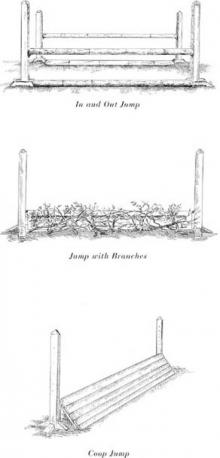 The Georges and the Jewels
The Georges and the Jewels Pie in the Sky: Book Four of the Horses of Oak Valley Ranch
Pie in the Sky: Book Four of the Horses of Oak Valley Ranch Duplicate Keys
Duplicate Keys Charles Dickens
Charles Dickens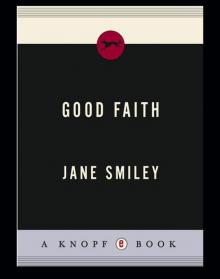 Good Faith
Good Faith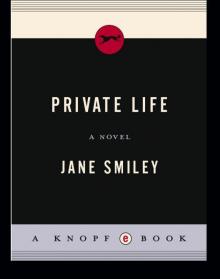 Private Life
Private Life A Thousand Acres: A Novel
A Thousand Acres: A Novel The Greenlanders
The Greenlanders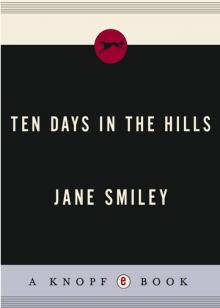 Ten Days in the Hills
Ten Days in the Hills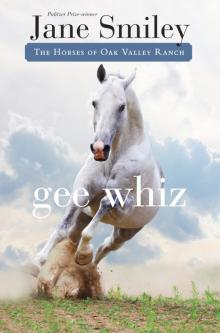 Gee Whiz: Book Five of the Horses of Oak Valley Ranch
Gee Whiz: Book Five of the Horses of Oak Valley Ranch A Thousand Acres
A Thousand Acres The All-True Travels and Adventures of Lidie Newton
The All-True Travels and Adventures of Lidie Newton Ordinary Love and Good Will
Ordinary Love and Good Will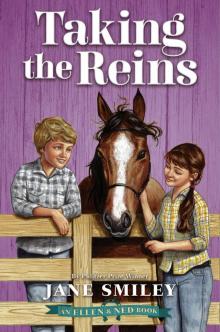 Taking the Reins (An Ellen & Ned Book)
Taking the Reins (An Ellen & Ned Book) The Man Who Invented the Computer
The Man Who Invented the Computer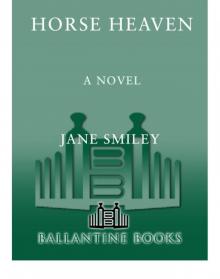 Horse Heaven
Horse Heaven The Age of Grief
The Age of Grief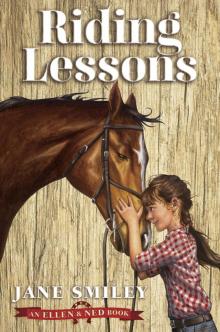 Riding Lessons
Riding Lessons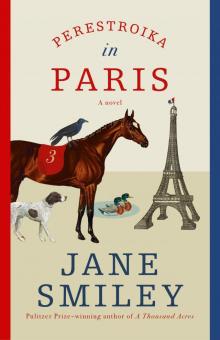 Perestroika in Paris
Perestroika in Paris A Good Horse: Book Two of the Horses of Oak Valley Ranch
A Good Horse: Book Two of the Horses of Oak Valley Ranch Saddles & Secrets (An Ellen & Ned Book)
Saddles & Secrets (An Ellen & Ned Book)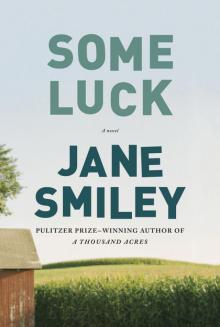 Some Luck: A Novel
Some Luck: A Novel Champion Horse
Champion Horse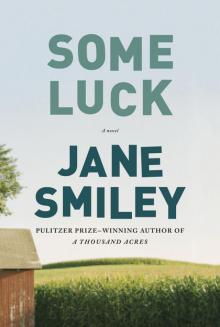 Some Luck
Some Luck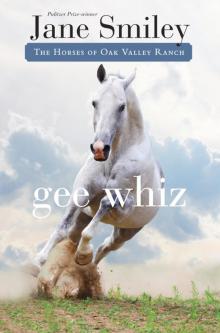 Gee Whiz
Gee Whiz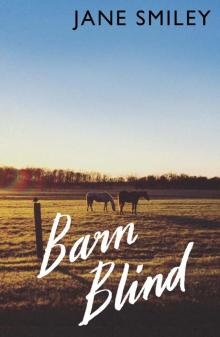 Barn Blind
Barn Blind A Thousand Acres (1992 Pulitzer Prize)
A Thousand Acres (1992 Pulitzer Prize) Pie in the Sky
Pie in the Sky True Blue
True Blue A Thousand Acres_A Novel
A Thousand Acres_A Novel A Good Horse
A Good Horse